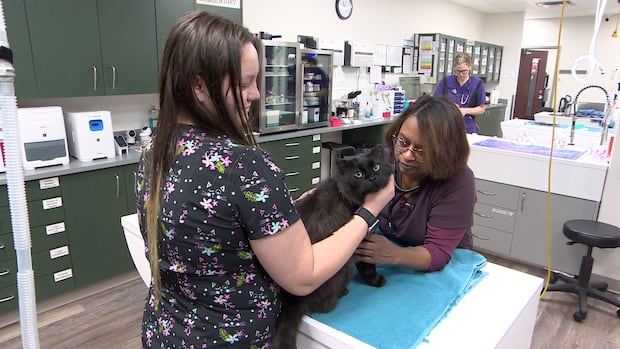SaskatchewanThe Canadian Veterinary Medical Association says shortages are driving up prices for pet medication, calling on the federal government to step in.Saskatchewan veterinarians say the cost of veterinary medicines has been steadily increasingHalyna Mihalik · CBC News · Posted: Nov 25, 2025 3:00 PM EST | Last Updated: 2 hours agoListen to this articleEstimated 3 minutesThe audio version of this article is generated by text-to-speech, a technology based on artificial intelligence.Staff at Fairlight Veterinary Services in Saskatoon say they’re experiencing intense burnout due to constant emergency appointments. (Chanss Lagaden/CBC)After giving professional care to animals for more than 20 years, Inoka Gamage knows how stressful the veterinary field has become.She owns her own practice at Fairlight Vet Services in Saskatoon. The long days and nights are constant, she told CBC.”We have to work more hours, late nights. Sometimes there are emergencies [that] come through the door that we cannot send away.”Gamage said burnout is apparent in every aspect of the profession, and the rising cost of medicine has only added to her stress.At a Monday news conference, the Canadian Veterinary Medical Association said prices for pet medications are on the rise and owners deserve access to affordable medicine. (Steven D’Souza/CBC)The national group representing veterinarians says supply shortages are driving up prices.At a news conference in Ottawa on Monday, the Canadian Veterinary Medical Association called on the federal government to regulate costly vet medicines.”First and foremost is a severe decline in the availability of many classes of medications, such as antibiotics, sedatives and other animal health products such as vaccines,” said the association’s president, Tracy Fisher.Call for federal actionIn part, Fisher blames changes to Health Canada’s registration process that make it more difficult to get medicines into Canada.To relieve strain on veterinarians, the national association called on Health Canada to:Slash red tape and costsCreate a national testing centre for foreign-trained veterinarians to enter the workforce more quicklyFund and create more mental-health supports for veterinary teamsHealth Canada did not respond to CBC’s request for a comment.WATCH | Veterinarians call for more support from federal government:Burned-out veterinarians urge government action to ease the strainWith many veterinarians reporting burnout, the Canadian Veterinary Medical Association is asking the federal government to take action on the price and availability of medications, make it faster to accredit foreign-trained vets and offer more mental health support.Client backlashSabrina Fagnou, a Saskatoon veterinary technician, said something needs to change quickly.She said pet owners often take their frustration out on staff for things they can’t control, and high prices just make it worse.”If this great medicine is $40, that’s on backorder, the next best thing is $80, then that client is going to be unhappy that it’s twice the price,” Fagnou said.She loves her job and doesn’t want to leave the profession like so many others, she said, telling CBC that vet techs usually have a turnaround of five years due to burnout and low wages. Saskatoon veterinarian clinic owner Inoka Gamage says she has struggled with provincial tax hikes on already costly vet medicine. (Chanss Lagaden/CBC)As the owner of a clinic, Gamage said she is very concerned by price increases for medicines.Saskatchewan veterinarians get their medicine supply from Alberta, and once it enters Saskatchewan, provincial taxes increase the cost even more, she said.”If we can get some kind of relief from the province for the tax aspect, that will be able to relieve some of our pressure.”Meanwhile, Canada’s Competition Bureau said Canadian pet owners should have more choices about where they can fill a prescription, like at any pharmacy they choose.The veterinarians’ association noted those drugs need to be available in Canada first.ABOUT THE AUTHORHalyna Mihalik is a journalist and weather specialist for CBC Saskatchewan. She holds a degree in journalism from the University of Regina. Halyna enjoys stories about advocacy, local politics and rural communities. Send Halyna news tips at halyna.mihalik@cbc.ca
Canadian veterinary association raises alarm on medicine shortages, staff burnout











